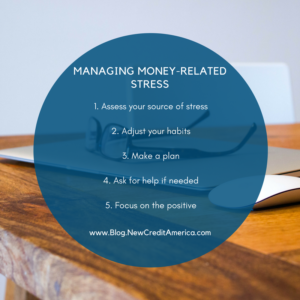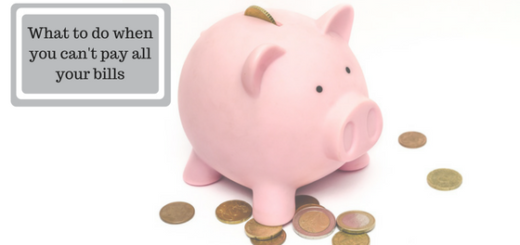Five Ways to Manage Money-Related Stress
 In a recent survey by the American Psychological Association, about 64% of Americans reported feeling “somewhat significant” or “very significant” amounts of stress due to money. Stress can have a deep impact on all aspects of life, from sleeping and eating habits, to trouble at work or a negative impact on relationships. Stress can also have a serious impact on your health, increasing your chance of heart attacks, strokes and other serious issues.
In a recent survey by the American Psychological Association, about 64% of Americans reported feeling “somewhat significant” or “very significant” amounts of stress due to money. Stress can have a deep impact on all aspects of life, from sleeping and eating habits, to trouble at work or a negative impact on relationships. Stress can also have a serious impact on your health, increasing your chance of heart attacks, strokes and other serious issues.
Worries about money can range from fear of not having adequate retirement savings, not being able to pay all your bills, to not being able to put food on the table or keep a roof over your head. These fears are real and very serious. If you are or have ever experienced financial stress, use these tips to help you stress less and rest easy.
Assess your source of stress.
Sometimes stress can come from the uncertainty of your financial situation. Your first step is to identify what’s bothering you. It could be unpaid balances on your credit card, student loan or mortgage payments, a lack of savings or anything in between.
Determine what you can adjust
Are there any daily habits or small sources of stress you can adjust to create some immediate relief? Maybe you can’t solve the larger problem in one day, but you can make small adjustments. For example, do you often resort to retail therapy when stressed? Constant shopping is an obvious detriment to spending woes. There are few adjustments you can make to beat this habit. Resist impulse shopping by deleting your card information from your computer and mobile devices (making it more difficult). You can also try substituting something else enjoyable in place of shopping any time you feel stressed (i.e: taking a walk, talking to a friend, or having a snack). Or, if you’re worried about your savings, try setting aside a few dollars every day for a month.
Whatever the worry is, try doing something small to take your mind off it and focus it on something productive.
Make a plan.
Often, stress lies in not knowing what to do next. Having a plan, no matter how small, will at least provide a way forward. Your plan could be to create a budget to help you reign in your spending, exploring debt settlement options or creating an emergency savings fund—to name a few things. Once you’ve come up with a plan, write it down and put it somewhere you can see it. Therefore, any time you feel stressed you can remember you do have a plan.
Don’t deal with this alone.
One of the things that can make stress so detrimental is internalizing all these toxic feelings. Not having an outlet for this stress will cause it to eat away at you. Share what’s going on with someone you trust. Another solution is to talk to a professional. There is no shame in seeking help. Often, this can help you better communicate your fears, get a new perspective or have someone to hold you accountable.
Another strategy is to seek out a money management class or even a group of other people facing similar issues. This is a productive use of time, and a way to lean on others for support.
Focus on the positive.
This might seem overly simple, but when you’re dealing with stress, positive thinking can help. One way to focus on the positive is to visualize your ideal (and attainable) financial outcome. Any time you think about your problems, think instead about your ideal resolution to the problem. Another strategy is to find something positive in each day. Then, write it down. Any time you feel stressed, look at all the positives. Remember that even if it seems small, you are making progress.
Ready to take the next step to combat your money woes? We can help. Call our team at (877) 373-2330 to find a customized solution that’s right for you.


